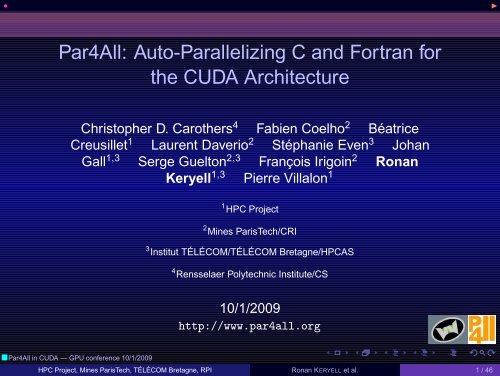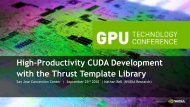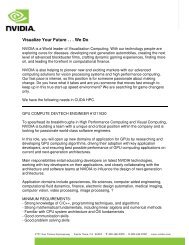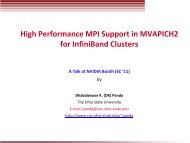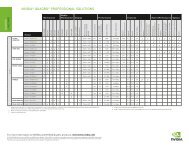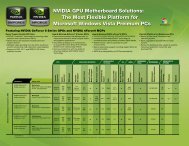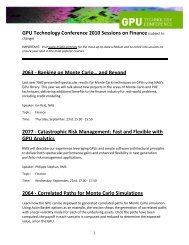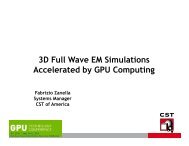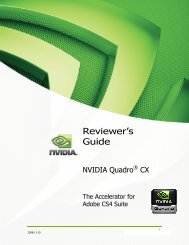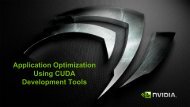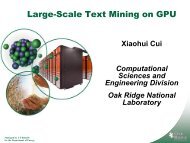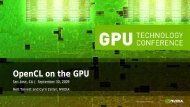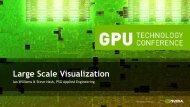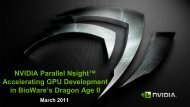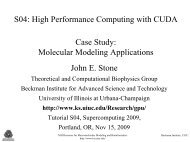Par4all: Auto-Parallelizing C and Fortran for the CUDA Architecture
Par4all: Auto-Parallelizing C and Fortran for the CUDA Architecture
Par4all: Auto-Parallelizing C and Fortran for the CUDA Architecture
Create successful ePaper yourself
Turn your PDF publications into a flip-book with our unique Google optimized e-Paper software.
• ◮<br />
Par4All: <strong>Auto</strong>-<strong>Parallelizing</strong> C <strong>and</strong> <strong>Fortran</strong> <strong>for</strong><br />
<strong>the</strong> <strong>CUDA</strong> <strong>Architecture</strong><br />
Christopher D. Caro<strong>the</strong>rs 4 Fabien Coelho 2 Béatrice<br />
Creusillet 1 Laurent Daverio 2 Stéphanie Even 3 Johan<br />
Gall 1,3 Serge Guelton 2,3 François Irigoin 2 Ronan<br />
Keryell 1,3 Pierre Villalon 1<br />
�Par4All in <strong>CUDA</strong> — GPU conference 10/1/2009<br />
1 HPC Project<br />
2 Mines ParisTech/CRI<br />
3 Institut TÉLÉCOM/TÉLÉCOM Bretagne/HPCAS<br />
4 Rensselaer Polytechnic Institute/CS<br />
10/1/2009<br />
http://www.par4all.org<br />
HPC Project, Mines ParisTech, TÉLÉCOM Bretagne, RPI Ronan KERYELL et al. 1 / 46
•Introduction ◮<br />
Through its Wild Systems subsidiary company<br />
• WildNode hardware desktop accelerator<br />
◮ Low noise <strong>for</strong> in-office operation<br />
◮ x86 manycore<br />
◮ nVidia Tesla GPU Computing<br />
◮ Linux & Windows<br />
• WildHive<br />
◮ Aggregate 2-4 nodes with 2 possible memory views<br />
� Distributed memory with E<strong>the</strong>rnet or InfiniB<strong>and</strong><br />
� Virtual shared memory through Linux Kerrighed <strong>for</strong> single-image<br />
system<br />
http://www.wild-systems.com<br />
�Par4All in <strong>CUDA</strong> — GPU conference 10/1/2009<br />
HPC Project, Mines ParisTech, TÉLÉCOM Bretagne, RPI Ronan KERYELL et al. 2 / 46
•Introduction ◮<br />
• Parallelize <strong>and</strong> optimize customer applications, co-br<strong>and</strong>ed as a<br />
bundle product in a WildNode (e.g. Presagis Stage battle-field<br />
simulator)<br />
• Acceleration software <strong>for</strong> <strong>the</strong> WildNode<br />
◮ GPU-accelerated libraries <strong>for</strong> Matlab/Octave/R<br />
◮ Transparent execution of Matlab on <strong>the</strong> WildNode<br />
• Remote display software <strong>for</strong> Windows on <strong>the</strong> WildNode<br />
HPC consulting<br />
• ◮ Optimization <strong>and</strong> parallelization of applications<br />
◮ High Per<strong>for</strong>mance?... not only TOP500-class systems: power-efficiency,<br />
embedded systems, green computing...<br />
◮ � Embedded system <strong>and</strong> application design<br />
◮ Training in parallel programming (OpenMP, MPI, TBB, <strong>CUDA</strong>,<br />
OpenCL...)<br />
�Par4All in <strong>CUDA</strong> — GPU conference 10/1/2009<br />
HPC Project, Mines ParisTech, TÉLÉCOM Bretagne, RPI Ronan KERYELL et al. 3 / 46
•Introduction ◮<br />
• HPC Project needs tools <strong>for</strong> its hardware accelerators (Wild<br />
Nodes from Wild Systems) <strong>and</strong> to parallelize, port & optimize<br />
customer applications<br />
• Application development: long-term business � long-term<br />
commitment in a tool that needs to survive to (too fast)<br />
technology change<br />
• Unreasonable to begin yet ano<strong>the</strong>r new compiler project...<br />
• Many academic Open Source projects are available...<br />
• ...But customers need products �<br />
Par4All<br />
• � Funding an initiative to industrialize Open Source tools<br />
• PIPS is <strong>the</strong> first project to enter <strong>the</strong> Par4All initiative<br />
http://www.par4all.org<br />
�Par4All in <strong>CUDA</strong> — GPU conference 10/1/2009<br />
HPC Project, Mines ParisTech, TÉLÉCOM Bretagne, RPI Ronan KERYELL et al. 4 / 46
•Par4All ◮<br />
1 Par4All<br />
2 <strong>CUDA</strong> generation<br />
3 Results<br />
4 Conclusion<br />
�Par4All in <strong>CUDA</strong> — GPU conference 10/1/2009<br />
HPC Project, Mines ParisTech, TÉLÉCOM Bretagne, RPI Ronan KERYELL et al. 5 / 46
•Par4All ◮<br />
Hardware is moving quite (too) fast but...<br />
What has survived <strong>for</strong> 50+ years?<br />
<strong>Fortran</strong> programs...<br />
What has survived <strong>for</strong> 30+ years?<br />
C programs...<br />
• A lot of legacy code could be pushed onto parallel hardware<br />
(accelerators) with automatic tools...<br />
• Not as efficient as h<strong>and</strong>-tuned programs, but quick production<br />
phase<br />
• Need automatic tools <strong>for</strong> source-to-source trans<strong>for</strong>mation to<br />
leverage existing software tools <strong>for</strong> a given hardware<br />
�Par4All in <strong>CUDA</strong> — GPU conference 10/1/2009<br />
HPC Project, Mines ParisTech, TÉLÉCOM Bretagne, RPI Ronan KERYELL et al. 6 / 46
•Par4All ◮<br />
(I)<br />
• PIPS (Interprocedural Parallelizer of Scientific Programs): Open<br />
Source project from Mines ParisTech... ≈ 150 hy, 21-year old!<br />
• Funded by many people (French DoD, Industry & Research<br />
Departments, University, CEA, IFP, Onera, ANR (French NSF),<br />
European projects, regional research clusters...)<br />
• Project that coined polytope model-based compilation<br />
• ≈ 456 KLOC according to David A. Wheeler’s SLOCCount<br />
• ... but modular <strong>and</strong> sensible approach to pass through <strong>the</strong> years<br />
◮ ≈300 phases (parsers, analyzers, trans<strong>for</strong>mations, optimizers,<br />
parallelizers, code generators, pretty-printers...) that can be<br />
combined <strong>for</strong> <strong>the</strong> right purpose<br />
◮ NewGen object description language <strong>for</strong> language-agnostic<br />
automatic generation of methods, persistence, object introspection,<br />
visitors, accessors, constructors, XML marshaling <strong>for</strong> interfacing<br />
with external tools...<br />
�Par4All in <strong>CUDA</strong> — GPU conference 10/1/2009<br />
HPC Project, Mines ParisTech, TÉLÉCOM Bretagne, RPI Ronan KERYELL et al. 7 / 46
•Par4All ◮<br />
(II)<br />
◮ Interprocedural à la make engine to chain <strong>the</strong> phases as needed.<br />
Lazy construction of resources<br />
◮ Polytope lattice (linear algebra) used <strong>for</strong> semantics analysis,<br />
trans<strong>for</strong>mations, code generation... to deal with big programs, not<br />
only loop-nests<br />
◮ Huge on-going ef<strong>for</strong>ts to industrialize <strong>the</strong> project, extension of <strong>the</strong><br />
semantics analysis <strong>for</strong> C<br />
• Around 15 programmers currently developing in PIPS (Mines<br />
ParisTech, HPC Project, IT SudParis, TÉLÉCOM Bretagne, RPI)<br />
with public svn, Trac, mailing lists, IRC, Plone, Skype... <strong>and</strong> use it<br />
<strong>for</strong> many projects<br />
• But still...<br />
◮ Huge need of documentation (even if PIPS uses literate<br />
programming...)<br />
◮ Need of industrialization<br />
◮ Need fur<strong>the</strong>r communication to increase community size<br />
�Par4All in <strong>CUDA</strong> — GPU conference 10/1/2009<br />
� Par4All initiative<br />
HPC Project, Mines ParisTech, TÉLÉCOM Bretagne, RPI Ronan KERYELL et al. 8 / 46
•Par4All ◮<br />
• <strong>Auto</strong>matic parallelization (C & <strong>Fortran</strong> to OpenMP)<br />
• Distributed memory computing with OpenMP-to-MPI translation<br />
(STEP project)<br />
• Generic vectorization <strong>for</strong> SIMD instructions (SSE, VMX...) (SAC<br />
project)<br />
• Parallelization <strong>for</strong> embedded systems (SCALOPES)<br />
• Compilation <strong>for</strong> hardware accelerators (Ter@PIX, SPoC, SIMD,<br />
FPGA...)<br />
• High-level hardware accelerators syn<strong>the</strong>sis generation <strong>for</strong> FPGA<br />
• Reverse engineering & decompiler (reconstruction from binary to<br />
C)<br />
Logical next stop<br />
GPU! �<br />
�Par4All in <strong>CUDA</strong> — GPU conference 10/1/2009<br />
HPC Project, Mines ParisTech, TÉLÉCOM Bretagne, RPI Ronan KERYELL et al. 9 / 46
•Par4All ◮<br />
• <strong>Auto</strong>matic parallelization (C & <strong>Fortran</strong> to OpenMP)<br />
• Distributed memory computing with OpenMP-to-MPI translation<br />
(STEP project)<br />
• Generic vectorization <strong>for</strong> SIMD instructions (SSE, VMX...) (SAC<br />
project)<br />
• Parallelization <strong>for</strong> embedded systems (SCALOPES)<br />
• Compilation <strong>for</strong> hardware accelerators (Ter@PIX, SPoC, SIMD,<br />
FPGA...)<br />
• High-level hardware accelerators syn<strong>the</strong>sis generation <strong>for</strong> FPGA<br />
• Reverse engineering & decompiler (reconstruction from binary to<br />
C)<br />
Logical next stop<br />
GPU! �<br />
�Par4All in <strong>CUDA</strong> — GPU conference 10/1/2009<br />
HPC Project, Mines ParisTech, TÉLÉCOM Bretagne, RPI Ronan KERYELL et al. 9 / 46
•<strong>CUDA</strong> generation ◮<br />
1 Par4All<br />
2 <strong>CUDA</strong> generation<br />
3 Results<br />
4 Conclusion<br />
�Par4All in <strong>CUDA</strong> — GPU conference 10/1/2009<br />
HPC Project, Mines ParisTech, TÉLÉCOM Bretagne, RPI Ronan KERYELL et al. 10 / 46
•<strong>CUDA</strong> generation ◮<br />
A sequential program on a host launches computational-intensive kernels<br />
on a GPU<br />
• Allocate storage on <strong>the</strong> GPU<br />
• Copy-in data from <strong>the</strong> host to <strong>the</strong> GPU<br />
• Launch <strong>the</strong> kernel on <strong>the</strong> GPU<br />
• Copy-out <strong>the</strong> results from <strong>the</strong> GPU to <strong>the</strong> host<br />
• Deallocate <strong>the</strong> storage on <strong>the</strong> GPU<br />
�Par4All in <strong>CUDA</strong> — GPU conference 10/1/2009<br />
HPC Project, Mines ParisTech, TÉLÉCOM Bretagne, RPI Ronan KERYELL et al. 11 / 46
•<strong>CUDA</strong> generation ◮<br />
• Find parallel kernels<br />
• Improve data reuse inside kernels to have better compute<br />
intensity (even if <strong>the</strong> memory b<strong>and</strong>width is quite higher than on a<br />
CPU...)<br />
• Access <strong>the</strong> memory in a GPU-friendly way (to coalesce memory<br />
accesses)<br />
• Take advantage of complex memory hierarchy that make <strong>the</strong><br />
GPU fast (shared memory, cached texture memory, registers...)<br />
• Reduce <strong>the</strong> copy-in <strong>and</strong> copy-out transfers that pile up on <strong>the</strong><br />
PCIe<br />
• Reduce memory usage in <strong>the</strong> GPU (no swap <strong>the</strong>re, yet...)<br />
• Limit inter-block synchronizations<br />
• Overlap computations <strong>and</strong> GPU-CPU transfers (via streams)<br />
�Par4All in <strong>CUDA</strong> — GPU conference 10/1/2009<br />
HPC Project, Mines ParisTech, TÉLÉCOM Bretagne, RPI Ronan KERYELL et al. 12 / 46
•<strong>CUDA</strong> generation ◮<br />
Most fundamental <strong>for</strong> a parallel execution<br />
Finding parallelism!<br />
Several parallelization algorithms are available in PIPS<br />
• For example classical Allen & Kennedy use loop distribution<br />
more vector-oriented than kernel-oriented (or need later<br />
loop-fusion)<br />
• Coarse grain parallelization based on <strong>the</strong> independence of array<br />
regions used by different loop iterations<br />
◮ Currently used because generates GPU-friendly coarse-grain<br />
parallelism<br />
◮ Accept complex control code without if-conversion<br />
�Par4All in <strong>CUDA</strong> — GPU conference 10/1/2009<br />
HPC Project, Mines ParisTech, TÉLÉCOM Bretagne, RPI Ronan KERYELL et al. 13 / 46
•<strong>CUDA</strong> generation ◮<br />
(I)<br />
Parallel code � Kernel code on GPU<br />
• Need to extract parallel source code into kernel source code:<br />
outlining of parallel loop-nests<br />
• Be<strong>for</strong>e:<br />
1 f o r(i = 1;i
•<strong>CUDA</strong> generation ◮<br />
(II)<br />
• After:<br />
1 p4a_kernel_launcher_0(space, save);<br />
[...]<br />
3 void p4a_kernel_launcher_0(float_t space[SIZE][SIZE],<br />
float_t save[SIZE][SIZE]) {<br />
5 f o r(i = 1; i
•<strong>CUDA</strong> generation ◮<br />
(I)<br />
• Memory accesses are summed up <strong>for</strong> each statement as regions<br />
<strong>for</strong> array accesses: integer polytope lattice<br />
• There are regions <strong>for</strong> write access <strong>and</strong> regions <strong>for</strong> read access<br />
• The regions can be exact if PIPS can prove that only <strong>the</strong>se<br />
points are accessed, or <strong>the</strong>y can be inexact, if PIPS can only find<br />
an over-approximation of what is really accessed<br />
�Par4All in <strong>CUDA</strong> — GPU conference 10/1/2009<br />
HPC Project, Mines ParisTech, TÉLÉCOM Bretagne, RPI Ronan KERYELL et al. 16 / 46
•<strong>CUDA</strong> generation ◮<br />
(II)<br />
Example<br />
1 fo r ( i = 0; i
•<strong>CUDA</strong> generation ◮<br />
(I)<br />
Conservative approach to generate communications<br />
• Associate any GPU memory allocation with a copy-in to keep its<br />
value in sync with <strong>the</strong> host code<br />
• Associate any GPU memory deallocation with a copy-out to keep<br />
<strong>the</strong> host code in sync with <strong>the</strong> updated values on <strong>the</strong> GPU<br />
• But a kernel could initialize an array, or use <strong>the</strong> initial values<br />
without writing into it, or use it as a local (private) array<br />
• (PIPS does have many privatization phases)<br />
�Par4All in <strong>CUDA</strong> — GPU conference 10/1/2009<br />
HPC Project, Mines ParisTech, TÉLÉCOM Bretagne, RPI Ronan KERYELL et al. 18 / 46
•<strong>CUDA</strong> generation ◮<br />
(II)<br />
• PIPS gives 2 very interesting region types <strong>for</strong> this purpose<br />
◮ In-region abstracts what really needed by a statement<br />
◮ Out-region abstracts what really produced by a statement to be<br />
used later elsewhere<br />
• In-Out regions can directly be translated with <strong>CUDA</strong> into<br />
◮ copy-in<br />
1 cudaMemcpy(accel_address , host_address ,<br />
2 size, cudaMemcpyHostToDevice)<br />
◮ copy-out<br />
1 cudaMemcpy(host_address , accel_address ,<br />
2 size, cudaMemcpyDeviceToHost)<br />
�Par4All in <strong>CUDA</strong> — GPU conference 10/1/2009<br />
HPC Project, Mines ParisTech, TÉLÉCOM Bretagne, RPI Ronan KERYELL et al. 19 / 46
•<strong>CUDA</strong> generation ◮<br />
• Hardware accelerators use fixed iteration space (<strong>CUDA</strong>: thread<br />
index starting from 0...)<br />
• Parallel loops: more general iteration space<br />
• Loop normalization<br />
Be<strong>for</strong>e<br />
1 f o r(i = 1;i < SIZE - 1; i++)<br />
2 f o r(j = 1;j < SIZE - 1; j++) {<br />
save[i][j] = 0.25*(space[i - 1][j] + space[i + 1][j]<br />
4 + space[i][j - 1] + space[i][j + 1]);<br />
}<br />
After<br />
1 f o r(i = 0;i < SIZE - 2; i++)<br />
f o r(j = 0;j < SIZE - 2; j++) {<br />
3 save[i+1][j+1] = 0.25*(space[i][j + 1] + space[i + 2][j + 1]<br />
+ space[i + 1][j] + space[i + 1][j + 2])<br />
5 }<br />
�Par4All in <strong>CUDA</strong> — GPU conference 10/1/2009<br />
HPC Project, Mines ParisTech, TÉLÉCOM Bretagne, RPI Ronan KERYELL et al. 20 / 46
•<strong>CUDA</strong> generation ◮<br />
(I)<br />
• Parallel loop nests are compiled into a <strong>CUDA</strong> kernel wrapper<br />
launch<br />
• The kernel wrapper itself gets its virtual processor index with<br />
some blockIdx.x*blockDim.x + threadIdx.x<br />
• Since only full blocks of threads are executed, if <strong>the</strong> number of<br />
iterations in a given dimension is not a multiple of <strong>the</strong> blockDim,<br />
<strong>the</strong>re are incomplete blocks<br />
• An incomplete block means that some index overrun occurs if all<br />
<strong>the</strong> threads of <strong>the</strong> block are executed<br />
�Par4All in <strong>CUDA</strong> — GPU conference 10/1/2009<br />
HPC Project, Mines ParisTech, TÉLÉCOM Bretagne, RPI Ronan KERYELL et al. 21 / 46
•<strong>CUDA</strong> generation ◮<br />
(II)<br />
• So we need to generate code such as<br />
1 void p4a_kernel_wrapper_0( i n t k, i n t l,...)<br />
2 {<br />
k = blockIdx.x*blockDim.x + threadIdx.x;<br />
4 l = blockIdx.y*blockDim.y + threadIdx.y;<br />
i f (k >= 0 && k = 0 && l
•<strong>CUDA</strong> generation ◮<br />
(I)<br />
• Launching a GPU kernel is expensive<br />
◮ so we need to launch only kernels with a significant speed-up<br />
(launching overhead, memory CPU-GPU copy overhead...)<br />
• Some systems use #pragma to give a go/no-go in<strong>for</strong>mation to<br />
parallel execution<br />
1 #pragma omp parallel i f (size>100)<br />
• ∃ phase in PIPS to symbolically estimate complexity of<br />
statements<br />
• Based on preconditions<br />
• Use a SuperSparc2 model from <strong>the</strong> ’90s... �<br />
• Can be changed, but precise enough to have a coarse go/no-go<br />
in<strong>for</strong>mation<br />
• To be refined: use memory usage complexity to have in<strong>for</strong>mation<br />
about memory reuse (even a big kernel could be more efficient<br />
on a CPU if <strong>the</strong>re is a good cache use)<br />
�Par4All in <strong>CUDA</strong> — GPU conference 10/1/2009<br />
HPC Project, Mines ParisTech, TÉLÉCOM Bretagne, RPI Ronan KERYELL et al. 23 / 46
•<strong>CUDA</strong> generation ◮<br />
• Reduction are common patterns that need special care to be<br />
correctly parallelized<br />
• Reduction detection already implemented in PIPS<br />
• Efficient computation in <strong>CUDA</strong> needs to create local reduction<br />
trees in <strong>the</strong> thread-blocks<br />
• On-going implementation at Rensselaer Polytechnic Institute<br />
(RPI) with parallel-prefix<br />
�Par4All in <strong>CUDA</strong> — GPU conference 10/1/2009<br />
HPC Project, Mines ParisTech, TÉLÉCOM Bretagne, RPI Ronan KERYELL et al. 24 / 46
•<strong>CUDA</strong> generation ◮<br />
(I)<br />
• <strong>Fortran</strong> 77 parser available in PIPS<br />
• <strong>CUDA</strong> is C/C++ with some restrictions on <strong>the</strong> GPU-executed<br />
parts<br />
• Need a <strong>Fortran</strong> to C translator (f2c...)?<br />
• Only one internal representation is used in PIPS<br />
◮ Use <strong>the</strong> <strong>Fortran</strong> parser<br />
◮ Use <strong>the</strong> C pretty-printer<br />
• But <strong>the</strong> IO <strong>Fortran</strong> library is complex to use... <strong>and</strong> to translate<br />
◮ If you have IO instructions in a <strong>Fortran</strong> loop-nest, it is not<br />
parallelized anyway because of sequential side effects �<br />
◮ So keep <strong>the</strong> <strong>Fortran</strong> output everywhere but in <strong>the</strong> parallel <strong>CUDA</strong><br />
kernels<br />
◮ Apply a memory access transposition phasea(i,j) �<br />
a[j-1][j-1] inside <strong>the</strong> kernels to be pretty-printed as C<br />
• We could output <strong>CUDA</strong> <strong>Fortran</strong> directly when available<br />
�Par4All in <strong>CUDA</strong> — GPU conference 10/1/2009<br />
HPC Project, Mines ParisTech, TÉLÉCOM Bretagne, RPI Ronan KERYELL et al. 25 / 46
•<strong>CUDA</strong> generation ◮<br />
(II)<br />
• <strong>Fortran</strong> 90 <strong>and</strong> 95 support is quite interesting<br />
◮ Dynamic allocation<br />
� Avoid nasty user allocation functions in <strong>Fortran</strong> 77 used to allocate<br />
objects in a big array...<br />
� Was a parallelism killer...<br />
◮ Derived types (C structures)<br />
� Avoid using more dimensions to arrays to simulate structure fields in<br />
<strong>Fortran</strong> 77<br />
� Was a parallelism killer, used useless dereferencing...<br />
◮ Pointers<br />
� Useful to navigate through recursive derived type<br />
� Was a parallelism killer, used useless dereferencing...<br />
� Mmm... Try to avoid this anyway �<br />
• Most of <strong>the</strong>se concepts are in C, so are already dealt by PIPS<br />
• � On-going <strong>Fortran</strong> 95 support with <strong>the</strong> gfc parser from GCC<br />
G<strong>for</strong>tran<br />
�Par4All in <strong>CUDA</strong> — GPU conference 10/1/2009<br />
HPC Project, Mines ParisTech, TÉLÉCOM Bretagne, RPI Ronan KERYELL et al. 26 / 46
•<strong>CUDA</strong> generation ◮<br />
(III)<br />
• Object-oriented <strong>Fortran</strong> 2003? Hard <strong>for</strong> a compiler to underst<strong>and</strong><br />
<strong>the</strong> object-oriented interprocedural polymorphism...<br />
• Programmer should avoid it at low-level <strong>for</strong> per<strong>for</strong>mance issues<br />
◮ Some high-per<strong>for</strong>mance optimizations need to change data<br />
organization...<br />
◮ ... that means object model restructuring �<br />
• Is <strong>the</strong>re a cultural community big enough to have object-oriented<br />
<strong>Fortran</strong> programs? Need a big library ecosystem to have<br />
competitive advantage...<br />
�Par4All in <strong>CUDA</strong> — GPU conference 10/1/2009<br />
HPC Project, Mines ParisTech, TÉLÉCOM Bretagne, RPI Ronan KERYELL et al. 27 / 46
•<strong>CUDA</strong> generation ◮<br />
(I)<br />
• <strong>CUDA</strong> can not be directly represented in <strong>the</strong> internal<br />
representation (IR, abstract syntax tree) such as __device__ or<br />
><br />
• PIPS motto: keep <strong>the</strong> IR as simple as possible<br />
• Use some calls to intrinsics functions that can be represented<br />
directly<br />
• Intrinsics functions are implemented with (macro-)functions<br />
◮ p4a_accel.h has indeed currently 2 implementations<br />
�Par4All in <strong>CUDA</strong> — GPU conference 10/1/2009<br />
� p4a_accel-<strong>CUDA</strong>.h than can be compiled with <strong>CUDA</strong> <strong>for</strong> nVidia GPU<br />
execution or emulation on CPU<br />
� p4a_accel-OpenMP.h that can be compiled with an OpenMP compiler<br />
<strong>for</strong> simulation on a (multicore) CPU<br />
HPC Project, Mines ParisTech, TÉLÉCOM Bretagne, RPI Ronan KERYELL et al. 28 / 46
•<strong>CUDA</strong> generation ◮<br />
(II)<br />
1 i n t main( i n t argc, char *argv[]) {<br />
[...]<br />
3 float_t (*p4a_var_space)[SIZE][SIZE];<br />
P4A_ACCEL_MALLOC(&p4a_var_space , s i z e o f(space));<br />
5 P4A_COPY_TO_ACCEL(space, p4a_var_space , s i z e o f(space));<br />
7 float_t (*p4a_var_save)[SIZE][SIZE];<br />
P4A_ACCEL_MALLOC(&p4a_var_save , s i z e o f(save));<br />
9 P4A_COPY_TO_ACCEL(save, p4a_var_save , s i z e o f(save));<br />
11 P4A_ACCEL_TIMER_START;<br />
13 f o r(t = 0; t < T; t++)<br />
compute(*p4a_var_space , *p4a_var_save);<br />
15<br />
double execution_time = P4A_ACCEL_TIMER_STOP_AND_FLOAT_MEASURE ()<br />
17 P4A_COPY_FROM_ACCEL(space, p4a_var_space , s i z e o f(space));<br />
19 P4A_ACCEL_FREE(p4a_var_space);<br />
P4A_ACCEL_FREE(p4a_var_save);<br />
�Par4All in <strong>CUDA</strong> — GPU conference 10/1/2009<br />
HPC Project, Mines ParisTech, TÉLÉCOM Bretagne, RPI Ronan KERYELL et al. 29 / 46
•<strong>CUDA</strong> generation ◮<br />
(III)<br />
21 [...]<br />
}<br />
23 void compute(float_t space[SIZE][SIZE],<br />
float_t save[SIZE][SIZE]) {<br />
25 [...]<br />
p4a_kernel_launcher_0(space, save);<br />
27 [...]<br />
}<br />
29 void p4a_kernel_launcher_0(float_t space[SIZE][SIZE],<br />
float_t save[SIZE][SIZE]) {<br />
31 P4A_CALL_ACCEL_KERNEL_2D(p4a_kernel_wrapper_0 , SIZE, SIZE,<br />
space, save);<br />
33 }<br />
P4A_ACCEL_KERNEL_WRAPPER void<br />
35 p4a_kernel_wrapper_0(float_t space[SIZE][SIZE],<br />
float_t save[SIZE][SIZE]) {<br />
37 i n t j;<br />
i n t i;<br />
39 i = P4A_VP_0;<br />
j = P4A_VP_1;<br />
�Par4All in <strong>CUDA</strong> — GPU conference 10/1/2009<br />
HPC Project, Mines ParisTech, TÉLÉCOM Bretagne, RPI Ronan KERYELL et al. 30 / 46
•<strong>CUDA</strong> generation ◮<br />
(IV)<br />
41 i f (i >= 1 && i = 1 && j
•Results ◮<br />
1 Par4All<br />
2 <strong>CUDA</strong> generation<br />
3 Results<br />
4 Conclusion<br />
�Par4All in <strong>CUDA</strong> — GPU conference 10/1/2009<br />
HPC Project, Mines ParisTech, TÉLÉCOM Bretagne, RPI Ronan KERYELL et al. 32 / 46
•Results ◮<br />
Laser<br />
n<br />
n<br />
m<br />
m<br />
• Holotetrix’s primary activities are <strong>the</strong> design, fabrication <strong>and</strong><br />
commercialization of prototype diffractive optical elements (DOE)<br />
<strong>and</strong> micro-optics <strong>for</strong> diverse industrial applications such as LED<br />
illumination, laser beam shaping, wavefront analyzers, etc.<br />
• Hologram verification with direct Fresnel simulation<br />
• Program in C<br />
• Parallelized with<br />
◮ Par4All <strong>CUDA</strong> <strong>and</strong> <strong>CUDA</strong> 2.3, Linux Ubuntu x86-64<br />
◮ Par4All OpenMP, gcc 4.3, Linux Ubuntu x86-64<br />
• Reference: Intel Core2 6600 @ 2.40GHz<br />
http://www.holotetrix.com<br />
Visit us at <strong>the</strong> Wild Systems booth #35 <strong>for</strong> a demo<br />
�Par4All in <strong>CUDA</strong> — GPU conference 10/1/2009<br />
HPC Project, Mines ParisTech, TÉLÉCOM Bretagne, RPI Ronan KERYELL et al. 33 / 46
•Results ◮<br />
(I)<br />
Average time in s (5 samples)<br />
100<br />
10<br />
1<br />
0.1<br />
0.01<br />
�Par4All in <strong>CUDA</strong> — GPU conference 10/1/2009<br />
2c Intel 6600 2,4 GHz (OpenMP)<br />
8c Intel X5472 3 GHz (OpenMP)<br />
8c X5570 2,9 GHz (OpenMP)<br />
GTX 200 192 streams<br />
DOUBLE PRECISION<br />
Tesla 1060 240 streams<br />
0.001<br />
100 200 300<br />
Matrix size (Kbytes)<br />
1c Intel 6600 2,4 GHz<br />
1c Intel X5472 3 GHz<br />
or X5570 2,9 GHz<br />
HPC Project, Mines ParisTech, TÉLÉCOM Bretagne, RPI Ronan KERYELL et al. 34 / 46<br />
/2<br />
/7<br />
/20<br />
/20
•Results ◮<br />
(II)<br />
Speed up<br />
100<br />
10<br />
�Par4All in <strong>CUDA</strong> — GPU conference 10/1/2009<br />
1<br />
Tesla 1060 240 streams<br />
GTX 200 192 streams<br />
8c Intel X5472 3 GHz (OpenMP)<br />
2c Intel Core2 6600 2,4 GHz (OpenMP)<br />
1c Intel X5472 3 GHz<br />
DOUBLE PRECISION<br />
200 300<br />
Matrix size (Kbytes)<br />
Reference 1c Intel 6600 2,4 GHz<br />
HPC Project, Mines ParisTech, TÉLÉCOM Bretagne, RPI Ronan KERYELL et al. 35 / 46
•Results ◮<br />
(I)<br />
Average time in s (5 samples)<br />
100<br />
10<br />
1<br />
0.1<br />
�Par4All in <strong>CUDA</strong> — GPU conference 10/1/2009<br />
2c Intel 6600 2,4 GHz (OpenMP)<br />
2c Intel T9400 2,5 GHz (OpenMP)<br />
8c Intel X5472 3 GHz (OpenMP)<br />
8c X5570 2,9 GHz (OpenMP)<br />
0.01<br />
Quadro FX 3700M (G92GL) 128 streams<br />
GTX 200 192 streams<br />
SIMPLE PRECISION Tesla 1060 240 streams<br />
0.001<br />
50 100 200 300<br />
/2<br />
Matrix size (Kbytes)<br />
1c Intel 6600 2,4 GHz<br />
1c Intel T9400 2,5 GHz<br />
1c Intel X5472 3 GHz<br />
or X5570 2,9 GHz<br />
HPC Project, Mines ParisTech, TÉLÉCOM Bretagne, RPI Ronan KERYELL et al. 36 / 46<br />
/8<br />
/35<br />
/140<br />
/175
•Results ◮<br />
(II)<br />
Speed up<br />
1000<br />
100<br />
10<br />
�Par4All in <strong>CUDA</strong> — GPU conference 10/1/2009<br />
1<br />
Tesla 1060 240 streams<br />
GTX 200 192 streams<br />
Quadro FX 3700M (G92GL)128 streams<br />
8c Intel X5472 3 GHz (OpenMP)<br />
2c Intel T9400 2,5 GHz (OpenMP)<br />
2c Intel 6600 2,4 GHz (OpenMP)<br />
1c Intel X5472 3 GHz<br />
1c Intel T9400 2,5 GHz<br />
SIMPLE PRECISION<br />
100 Reference 1c Intel 6600 2,4 GHz 200<br />
Matrix size (Kbytes)<br />
HPC Project, Mines ParisTech, TÉLÉCOM Bretagne, RPI Ronan KERYELL et al. 37 / 46
•Conclusion ◮<br />
1 Par4All<br />
2 <strong>CUDA</strong> generation<br />
3 Results<br />
4 Conclusion<br />
�Par4All in <strong>CUDA</strong> — GPU conference 10/1/2009<br />
HPC Project, Mines ParisTech, TÉLÉCOM Bretagne, RPI Ronan KERYELL et al. 38 / 46
•Conclusion ◮<br />
(I)<br />
• BaC99k to C99imple C99ings<br />
• Avoiding using C99umbersome old C C99onstruC99ts C99an lead<br />
to C99leaner C99ode, more effiC99ient <strong>and</strong> more parallelizable<br />
C99ode with Par4All<br />
• C99 adds C99ympaC99etiC99 features that are un<strong>for</strong>tunately not<br />
well known:<br />
◮ MultidimenC99ional arrays with non-statiC99c size<br />
� Avoid malloc() <strong>and</strong> useless pointer C 99onstruC 99ions<br />
� You C 99an have arrays with a dynamiC 99 size in funC 99tion<br />
parameters (as in <strong>Fortran</strong>)<br />
� Avoid useless linearizing C 99omputaC 99ions (a[i][j] instead of<br />
a[i+n*j]...)<br />
� Avoid most of alloca()<br />
◮ TLS (Thread-Local Storage) ExtenC99ion C99an express<br />
independent storage<br />
◮ C99omplex numbers <strong>and</strong> booleans avoid fur<strong>the</strong>r struC99tures or<br />
enums<br />
�Par4All in <strong>CUDA</strong> — GPU conference 10/1/2009<br />
HPC Project, Mines ParisTech, TÉLÉCOM Bretagne, RPI Ronan KERYELL et al. 39 / 46
•Conclusion ◮<br />
Why open source?<br />
• Once upon a time, a research team in Luxembourg decided to<br />
experiment program trans<strong>for</strong>mations with genetic algorithms...<br />
• Main idea:<br />
◮ Represent <strong>the</strong> trans<strong>for</strong>mations applied to a program as a gene<br />
◮ Make <strong>the</strong> genes to evolve<br />
◮ Measure <strong>the</strong> per<strong>for</strong>mance<br />
◮ Select <strong>and</strong> iterate<br />
• They used PIPS to implement this<br />
• Side effects<br />
◮ Now PIPS is scriptable in Python (PYPS)<br />
◮ Algorithm written in Python<br />
◮ We have an automated way to try many different optimizations to<br />
generate better <strong>CUDA</strong> kernels!<br />
Stay tuned...<br />
�Par4All in <strong>CUDA</strong> — GPU conference 10/1/2009<br />
HPC Project, Mines ParisTech, TÉLÉCOM Bretagne, RPI Ronan KERYELL et al. 40 / 46
•Conclusion ◮<br />
(I)<br />
• Use advanced tiling to take advantage of shared memory <strong>and</strong><br />
texture cache<br />
• Select optimal trans<strong>for</strong>mations <strong>and</strong> code generation parameter<br />
by using genetic algorithm system already in PIPS<br />
• Using complexity in<strong>for</strong>mation to select <strong>the</strong> best execution mode<br />
(GPU or CPU)<br />
• Mix GPU <strong>and</strong> CPU execution, with SSEx, OpenMP <strong>and</strong>/or MPI<br />
• Matlab to <strong>CUDA</strong> compiler<br />
• OpenCL support via OpenGPU project<br />
• Eclipse (EcliPIPS) integration via OpenGPU project<br />
• If someone spent some time to write #pragma in<strong>for</strong>mation... Use<br />
<strong>the</strong>m! �<br />
• Generate run-time specialization <strong>and</strong> speculation when some<br />
static in<strong>for</strong>mation is lacking at compilation time<br />
�Par4All in <strong>CUDA</strong> — GPU conference 10/1/2009<br />
HPC Project, Mines ParisTech, TÉLÉCOM Bretagne, RPI Ronan KERYELL et al. 41 / 46
•Conclusion ◮<br />
(II)<br />
• We have already PhD students, engineers <strong>and</strong> researchers<br />
around Par4ll, but many hard issues remains, so we need you<br />
too... �<br />
�Par4All in <strong>CUDA</strong> — GPU conference 10/1/2009<br />
HPC Project, Mines ParisTech, TÉLÉCOM Bretagne, RPI Ronan KERYELL et al. 42 / 46
•Conclusion ◮<br />
(I)<br />
• GPU (<strong>and</strong> o<strong>the</strong>r heterogeneous accelerators): impressive peak<br />
per<strong>for</strong>mances <strong>and</strong> memory b<strong>and</strong>width, power efficient<br />
• Looks like to <strong>the</strong> 80’s : many accelerators, vectors, parallel<br />
computers<br />
◮ Need to port <strong>the</strong> programs to new architectures<br />
◮ Many start-ups<br />
• ...but some hypo<strong>the</strong>sis changed, hardware constraints � we can<br />
no longer escape parallelism! No longer a niche market!<br />
• Programming is quite more complex... �<br />
• Non-functional specifications (speed, time, power, parallelism...)<br />
not taken into account by main-stream programming<br />
environment <strong>and</strong> teaching (high-level object programming...)<br />
• And programs are quite bigger now! �<br />
• Application source code evolves slowly compared to hardware<br />
�Par4All in <strong>CUDA</strong> — GPU conference 10/1/2009<br />
HPC Project, Mines ParisTech, TÉLÉCOM Bretagne, RPI Ronan KERYELL et al. 43 / 46
•Conclusion ◮<br />
(II)<br />
• Capitalize on this with a source-to-source tool!<br />
• Be<strong>for</strong>e addressing parallelism, may be interesting to optimize <strong>the</strong><br />
sequential program (algorithmic, coding, right tools...)<br />
• Take a positive attitude...Parallelization is a good opportunity <strong>for</strong><br />
deep cleaning (refactoring, modernization...) � improve also <strong>the</strong><br />
original code<br />
• A cleaner code is often easier to parallelize automatically or<br />
manually<br />
• Do not <strong>for</strong>get simple precision exist too... �<br />
• Entry cost<br />
• Exit cost! �<br />
• Par4All initiative aims at minimizing entry cost <strong>and</strong> exit cost<br />
◮ Use source-to-source compilers to surf on <strong>the</strong> best back-ends<br />
(<strong>CUDA</strong> <strong>for</strong> nVidia GPU)<br />
◮ Avoid manual work with preprocessing, tools, code generators...<br />
�Par4All in <strong>CUDA</strong> — GPU conference 10/1/2009<br />
HPC Project, Mines ParisTech, TÉLÉCOM Bretagne, RPI Ronan KERYELL et al. 44 / 46
•Conclusion ◮<br />
(III)<br />
◮ Open source architecture to collaborate with best research teams<br />
◮ Use st<strong>and</strong>ards <strong>and</strong> Open Source <strong>for</strong> long-term investment<br />
◮ Open source to avoid sticking to a one-company solution<br />
◮ Hide manual work in preprocessing, tools, code generators...<br />
◮ Can accept #pragma from o<strong>the</strong>r products as a second-source<br />
◮ Come on <strong>and</strong> participate to <strong>the</strong> initiative!<br />
You are not a compiler developer <strong>and</strong> you may ask what to keep from<br />
such a talk?<br />
If you underst<strong>and</strong> better how a compiler work, you can write code that<br />
fits better <strong>the</strong> compiler... �<br />
Visit us at <strong>the</strong> Wild Systems booth #35 <strong>for</strong> a demo<br />
�Par4All in <strong>CUDA</strong> — GPU conference 10/1/2009<br />
HPC Project, Mines ParisTech, TÉLÉCOM Bretagne, RPI Ronan KERYELL et al. 45 / 46
•Conclusion ◮<br />
• HPC Project<br />
• Mines ParisTech<br />
• Institut TÉLÉCOM/TÉLÉCOM Bretagne<br />
• Rensselaer Polytechnic Institute<br />
• European ARTEMIS SCALOPES project<br />
• French NSF (ANR) FREIA project<br />
• French Images <strong>and</strong> Networks research cluster TransMedi@<br />
project<br />
• French System@TIC research cluster OpenGPU project<br />
�Par4All in <strong>CUDA</strong> — GPU conference 10/1/2009<br />
HPC Project, Mines ParisTech, TÉLÉCOM Bretagne, RPI Ronan KERYELL et al. 46 / 46
•Table des matières ◮<br />
HPC Project hardware: WildNode from Wild Systems 2<br />
HPC Project software <strong>and</strong> services 3<br />
We need software tools 4<br />
1 Par4All<br />
Outline 5<br />
Use <strong>the</strong> Source, Luke... 6<br />
PIPS 7<br />
Current PIPS usage 9<br />
Current PIPS usage 10<br />
2 <strong>CUDA</strong> generation<br />
Outline 11<br />
Basic <strong>CUDA</strong> execution model 12<br />
Challenges in automatic <strong>CUDA</strong> generation 13<br />
<strong>Auto</strong>matic parallelization 14<br />
Outlining 15<br />
From array regions to GPU memory allocation 17<br />
Communication generation 19<br />
Loop normalization 21<br />
�Par4All in <strong>CUDA</strong> — GPU conference 10/1/2009<br />
From preconditions to iteration clamping 22<br />
Complexity analysis 24<br />
Optimized reduction generation 25<br />
<strong>Fortran</strong> to <strong>CUDA</strong> 26<br />
Par4All accel runtime — <strong>the</strong> big picture 29<br />
3 Results<br />
Outline 33<br />
Results on a customer application 34<br />
Comparative per<strong>for</strong>mance 35<br />
Keep it simple (precision) 37<br />
4 Conclusion<br />
Outline 39<br />
Take advantage of C99 40<br />
From an open source project to genetic algorithms 41<br />
Future work 42<br />
Conclusion 44<br />
Par4All is currently supported by... 47<br />
You are here! 48<br />
HPC Project, Mines ParisTech, TÉLÉCOM Bretagne, RPI Ronan KERYELL et al. 46 / 46


